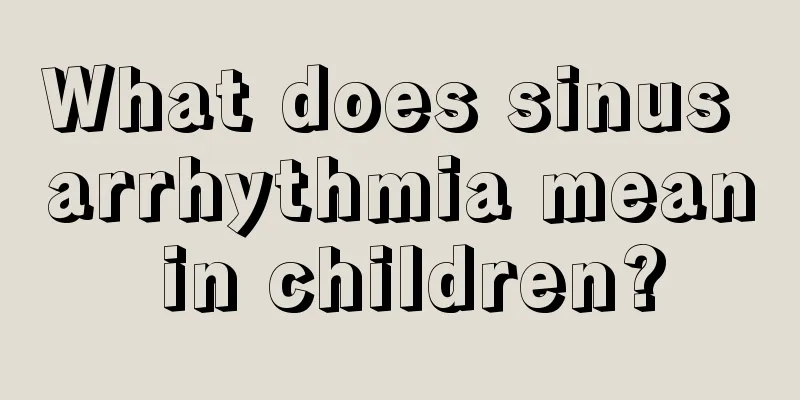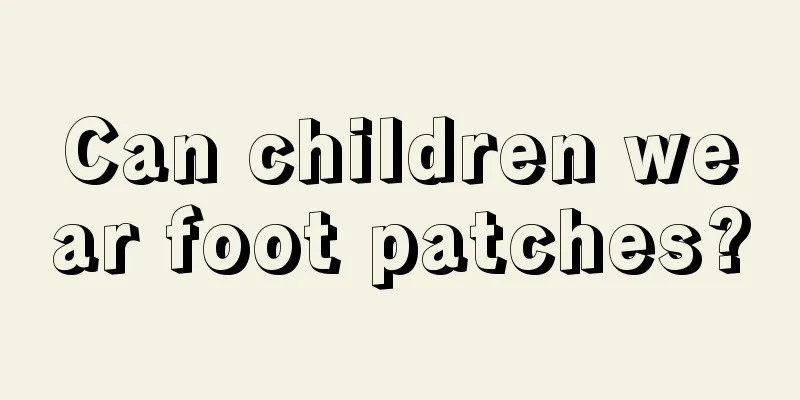What does sinus arrhythmia mean in children?

|
Many people are familiar with sinus arrhythmia. It is generally common in adults. There are many causes of sinus arrhythmia. Because each person has different physical conditions, the symptoms will also be different. Sinus arrhythmia is not only common in adults, but also in many children. Children can also experience sinus arrhythmia. Let us learn about it together. It is very common for children to have "sinus arrhythmia". Almost every child will experience it, especially those over 3 years old. If there is no underlying heart disease after examination, sinus arrhythmia alone does not require treatment. It will usually disappear gradually after the child reaches 12 years old. But why do children have sinus arrhythmia? Normally, the heartbeat rhythm is regular. If the heartbeat is irregular, we call it arrhythmia. The heartbeat of a normal person is controlled by the "sinoatrial node", which sends out signals to stimulate the heartbeat. The heartbeat caused by the signal from the sinoatrial node is called normal "sinus rhythm", with a frequency of 60 to 100 beats per minute. This is where the number of heart beats per minute, or heart rate, comes from. But this frequency is affected by many factors, including breathing and emotional changes. For example, the heart rate changes with breathing. The heart rate increases when inhaling, and it is more obvious when taking a deep breath. The heart rate slows down when exhaling. Its fast and slow cycle is exactly equal to one breathing cycle. The heart rhythm becomes regular when holding the breath. This "sinus arrhythmia" that changes with breathing is completely normal and there is no need to worry or treat it. Children are in the process of development, and their physiology and psychology are in a state of change. Their cardiac conduction system is immature, their physiological functions are not sound, and their autonomic nervous system is unstable. This leads to unstable regulation of the heart, making them more susceptible to sinus arrhythmia. A "chaotic" heart makes the heart healthier. "If parents find that their child has sinus arrhythmia, they should not only not worry, but be happy, because it is a good thing for the child." Liu Huailin also emphasized that according to experts' research on heart rate variability, sinus arrhythmia indicates that the child does not have organic heart disease, and this normal phenomenon is also beneficial to enhance the child's heart function and increase the heart's reserve capacity. Cardiac reserve refers to the possibility of an increase in the heart's working level, and the size of the cardiac reserve is related to a person's health, such as whether they can survive a serious illness, tolerate extreme heat or a high fever, or cope with high-intensity activities. The size of the cardiac reserve can be judged by the trend of heart rate changes. The greater the heart rate changes, the stronger the myocardial reserve. |
<<: What should I do if my child doesn't eat?
>>: What happens if a child has a lump in his breast?
Recommend
Treatment and prevention of stuttering in children, the harm of stuttering in children
Children who are very talented in language not on...
What should I do if my child has eczema on his feet?
In life, people all know that eczema is a common ...
Is yogurt good for babies?
Nowadays, every baby is spoiled by his parents, a...
Can babies eat black fungus?
Wood ear vegetable is actually a commonly consume...
When should babies supplement calcium and cod liver oil? Time it right
Nowadays, many young parents know that they must ...
Why are the newborn's testicles black?
Many new mothers, due to lack of experience and l...
What happens if my child has lymph nodes behind his neck?
Children are the cutest angels in the world and t...
What should be paid attention to in the diet of children with pneumonia
Young children are prone to becoming uncomfortabl...
Six-month weaning precautions
We all know that breast milk is good for the fetu...
What is the disease when the baby has a fever and convulsions?
Before I became a parent, I didn’t know how to ra...
Causes of hoarseness in children
Children are very cute, especially when they can&...
Normal blood pressure range for 12-year-olds
In fact, the blood pressure values of 12-year-o...
What to do if a child has a fever
What to do when a child has a fever? This is a pr...
What are the reasons why two-month-old babies cry at night?
Babies are a relatively weak group. They cannot s...
How to make spleen-strengthening and stomach-nourishing porridge for young children?
After a long and hot summer, some mothers are not...









